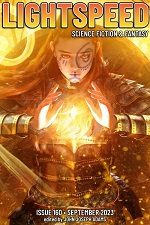 Lightspeed #160, September 2023
Lightspeed #160, September 2023
“Money in the Bank” by John Kessel and Bruce Sterling
“Instructions for the Broken Hearted” by Jordan Kurella
“Eve’s Prayer” by Victor Forna
“Simmered in Their Wealth Like the Richest of Sauces” by Jo Miles
“The Hole in the Garden” by Gene Doucette
“Remains” by N. R. Lambert
“Death by Water” by Maria Haskins
“His Thing” by Yvette Lisa Ndlovu
Reviewed by Victoria Silverwolf
Anchored by a new novelette from a pair of award-winning veteran writers, this issue offers a mixture of science fiction and fantasy, with the line between the two genres often blurring.
The narrator of “Money in the Bank” by John Kessel and Bruce Sterling takes on a false identity as a military security expert in order to hire out his services, via a third party, to a reclusive cryptocurrency billionaire. The assignment takes him from Las Vegas to Miami, leading to an extraordinary discovery.
I have deliberately avoided mentioning the story’s speculative content, which arrives out of nowhere and changes the mood from serious and realistic to outrageous and comic. It seems possible that one of the authors sprang a surprise on the other, taking the work in a wildly unexpected direction. Some readers will appreciate the sudden left turn, while others may find that it causes them to lose their suspension of disbelief.
The title of “Instructions for the Broken Hearted” by Jordan Kurella is literal, as “you” (the story is narrated in the currently popular second person mode) have your heart torn out of your body by a lover who is leaving you. The premise serves as a vivid, if obvious, parable for grief and healing. This brief work is best appreciated as an evocative prose poem rather than as a story.
The narrator of “Eve’s Prayer” by Victor Forna (possibly an enhanced ape, given one hint in the text, if this is not a metaphor) is sent to another world to determine if it is appropriate for human colonization. The narrator asks God if people should be informed that it is suitable, or if they should be prevented from ruining a pristine planet the way they did Earth.
Less than seven hundred words long, this tiny tale does not answer the question it raises, leaving it to the reader. The most interesting aspect of this miniscule work is the characterization of the narrator.
“Simmered in Their Wealth Like the Richest of Sauces” by Jo Miles is narrated by a dragon. Awakened after centuries, it confronts a modern billionaire after its treasure.
It is not surprising at all that the rich fellow is going to face the consequences of his greed. The story appears to be primarily an attack on those who accumulate vast amounts of wealth at the expense of others. One cannot doubt the author’s sincerity, regardless of how one feels about unrestricted capitalism.
“The Hole in the Garden” by Gene Doucette consists mostly of a bedtime story told by a man to his young daughter. In this tale, a man finds a black hole in his garden. The people he consults take advantage of the situation without regard for its dangers.
Without giving too much away, it is unsurprising how the bedtime story relates to the man’s real world. If nothing else, the work can be seen as an interesting experiment in narrative technique.
“Remains” by N. R. Lambert is labelled as fantasy, but it seems more like postapocalyptic science fiction. Once again narrated in second person, this very short story relates how “you” survive after an unspecified disaster. Almost entirely subjective and introspective, this brief tale is long on emotion but short on concrete details.
“Death by Water” by Maria Haskins, on the other hand, is called science fiction but seems much more like fantasy. A woman flees another unspecified disaster, losing parts of her body along the way and communing with sea creatures who have undergone a change.
As with the previous story, this work is much more effective at creating a mood than providing a fully developed narrative. There are many striking images, even if it is not entirely clear what is happening.
In “His Thing” by Yvette Lisa Ndlovu, a Zimbabwean woman is taken as a bride by a man who left Africa for the United States. She is literally trapped, in a supernatural way, inside her new home. Only a magical gift from a childhood friend offers the possibility of escape.
Part of the story is narrated by the magic object itself, adding an intriguing touch. Although full of references to Zimbabwean culture, the text will not confuse readers unfamiliar with that part of the world. The speculative content is original and imaginative. More than just an allegory for a woman stuck in an unhappy marriage, this dark fantasy has a compelling plot that will appeal to readers looking for a suspenseful story.
Victoria Silverwolf has to get a flu shot soon.